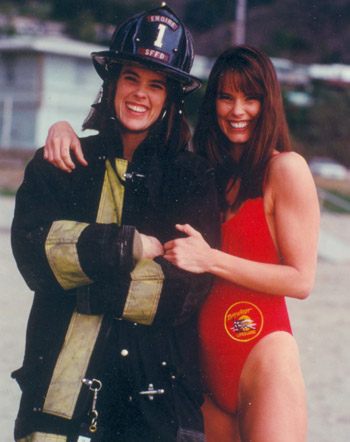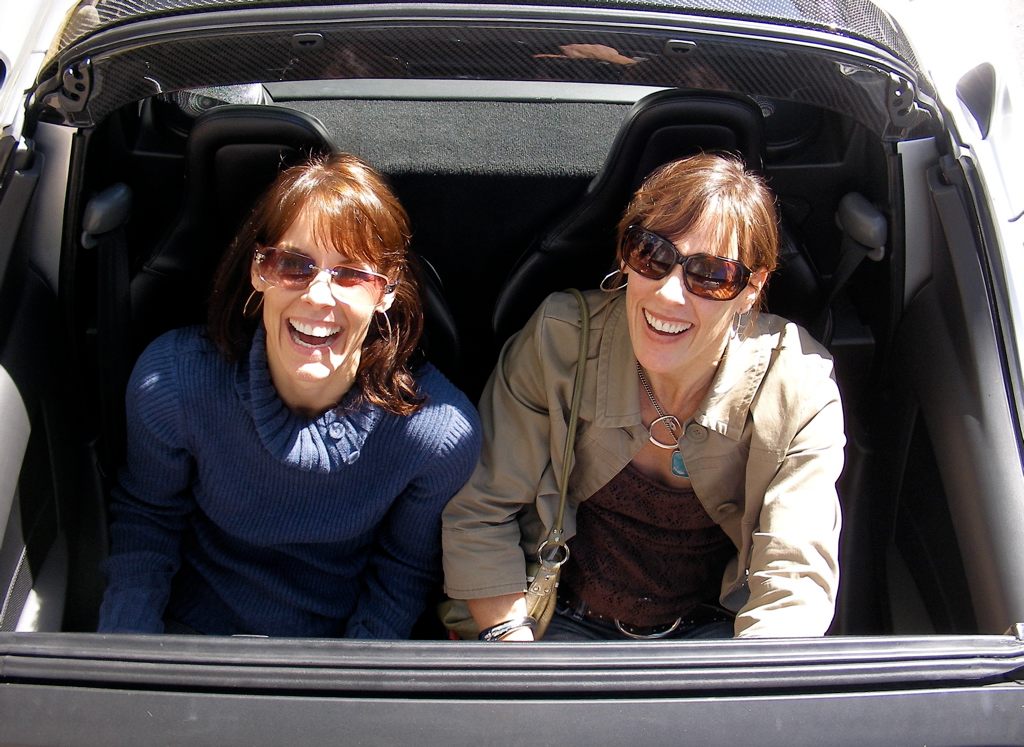The Time I Convinced A Hollywood Director that I Was My Identical Actress Twin
 The Paul twins, Caroline (left) and Alexandra (right). (Photo: Caroline Paul)
The Paul twins, Caroline (left) and Alexandra (right). (Photo: Caroline Paul)
This is an excerpt from the Kindle single called Almost Her: The Strange Dilemma of Being Nearly Famous, published by Shebooks about her experience as the twin of an actress who starred in Baywatch and the nature of celebrity. Buy the whole thing here, you won’t be sorry.
We shared 100 percent of our genes, but we grew up to very different lives. By our late 20s Alexandra was an established actress in Los Angeles, and I was a San Francisco firefighter. Our lives and work affected our looks; we weren’t exact replicas. Alexandra was 10 pounds lighter. My shoulders were broader. Her smile was wider. But two things connived, so that our unintended charade continued. We looked enough alike. Delighted Baywatch fans sidled up to me even when I was in full fire gear. Homeless men pointed, patients with chest pain peered, kids at a school fire drill broke rank screaming when they spotted me (a terrifying sight even for someone holding an ax). The possibility of an identical twin never crossed anyone’s mind. It was easier to believe that the Baywatch star had decided to swaddle herself in a turnout coat and helmet, grab that ax, and jump on a fire engine for the day. Was it because people watched so much television? Celebrities were already omnipresent in their lives, and it was just a small leap from the screen to the sidewalk in front of them.
This porous relationship between reality and entertainment was never more apparent than at a second alarm fire I fought during those years. The street was packed with gawkers when my crew and I arrived. More emerged from shops and nearby apartments, drawn to the smoke pouring from the windows, the screaming tenants, the sirens. One such rubbernecker accosted my officer as he headed to the building. “Is this a real fire,” the man asked. “Or is this a movie?”
My officer whirled around. Was the civilian drunk? Or was he just stupid?
“Of course it’s a real fire,” he barked.
The man retorted, “Then why did the Baywatch girl just run in there?”

A still from Christine, Alexandra Paul in the background. (Photo: Static Mass)
When we were 20 Alexandra landed her first big role, as the female lead in the movie Christine. For some reason (call it reckless youth), she decided it would be a great idea to bamboozle the film’s director, John Carpenter. A twin switch. On the set.
And so: an assistant spirited me into the make-up trailer. Alexandra was already there. We were dressed in identical corduroys and turtlenecks and then handed to the makeup artists, who seated us in front of beveled mirrors that multiplied each reflection. They rouged and lipsticked and mascaraed. They curled our hair. They lined our eyes. Late in the transformation I glanced to one side of the mirrors, then the other, and felt a sudden vertigo. I had lost track of which face was mine and which my twin’s. “Whoa,” I said, gripping the chair. I turned to stare at the real Alexandra, orienting. She was there, I was here. OK.
Alexandra’s costar, the only other person apprised of the charade, arrived at the trailer to lead me to the set.
I had imagined a long, silent walk where I would look around imperiously, maybe disapprovingly, pouting, tossing my hair, sighing. Weren’t actors supposed to be divas, speaking only to those at a certain imagined tier, shunning all others, unless it was to call for more bonbons and champagne? This was my acting debut and I was going to kill it, I thought to myself. I lifted my chin, threw my shoulders back, and pretended to know where the hell I was headed. But as I made my shaky way, gripping the costar’s sleeve, my script was suddenly altered. I was being hailed, it seemed, from all sides.
“Hi, Alexandra!” people called from behind lights, and on scaffolds, and by snack tables. Gaffers, grips, assistants, caterers. Some approached and asked me how I was, others smiled, eyes shining, with the delight of someone who has just spotted a kitten. I was bowled over; I knew Alexandra was nice enough but had not expected this, this outpouring. In my very bones, it struck me: my twin was an exceptional person. Not because she was in the movies. But because of something much deeper. She was kind, generous, good. She was exceptional in her soul, and people loved her for it.
And now I was expected to be her. I could put the makeup on, but more than that, I wasn’t sure. She was radiant, adored, and I was just, well, an impostor. “Hi,” I replied to each greeting, faintly. My method acting evaporated. I struggled to realign myself.
In that moment I thought: is it possible to live up to my twin?
There was no more time to ponder this existential crisis because we were suddenly face to face with John Carpenter. I greeted him with all the cheer I imagined my twin would and forced myself to chat amiably.
“Do you have a cold?” he asked abruptly. My voice sounded different.
I assured him I felt fine, and he murmured, OK, good, and then I clambered onto a waiting bulldozer. The shot was simple: “Just push the clutch,” the cinematographer told me. I nodded, and waited for Alexandra to appear so no film would be wasted and no union laws broken. But now John Carpenter was calling for the cameras to roll—Alexandra, Alexandra, I chanted in my head—to no avail. And… Action! Carpenter yelled. What choice did I have? I pushed the clutch. “Cut,” he shouted, and motioned for me to descend from the bulldozer. Just then Alexandra appeared at his shoulder. “Did you fire me already?” she asked. He turned to look at her. He paled. He jerked his head around to look at me. “What the…” he cried, before the whole room exploded in laughter and applause, suddenly understanding.*
“You’re so lucky!” singletons exclaim upon hearing stories like this one. “I wish I was a twin.”
“Well,” I tell them, “Perhaps you were.”
One in 90 live births result in twins (fraternal and identical), but one in eight begin as twins. This phenomenon of “the vanishing twin” still puzzles scientists; they aren’t sure why one disappears and one remains. The “how” is only a little clearer. The best guess is that the fetus is absorbed into the mother’s body; sometimes it may be assimilated into the surviving twin. Often it happens so early that no one is the wiser. But advances in technology mean that fetuses can be tracked earlier and earlier, and it’s now clear that many humans born alone may once have had a sibling in the womb.
While the numbers are new and surprising, the vanishing twin phenomenon has been recognized for centuries. Hair and teeth were found in singletons, often much later in life. Five tiny fetuses were once discovered in the brain of a child. A six-pound fetus was removed from an elderly man. Sometimes two fraternal embryos can merge to become one body—detected when blood tests show two different blood types (identicals may merge, too, but blood tests aren’t helpful). There is speculation that a child born hermaphroditic—with both male and female sex characteristics—is really a fusion of fraternal twins.
All of this is to say that 15 percent of singletons—and this is a conservative number—had a twin who disappeared sometime during pregnancy. What does this mean for the survivor? Is there a subconscious understanding that a twin was lost? Could this account for some singletons’ fascination with twins, or others’ inexplicable certainty that something is missing?

Identical twins rarely look exactly identical, but the resemblance still gets Caroline Paul attention from strangers. (Photo: Caroline Paul)
Celebrity is not an inner condition, like happiness or desperation; it is instead bestowed by the rest of us. Celebrity is not even dependent on something you consciously do; it is just, according to Merriam-Webster, the “state of being famous, celebrated.” A celebrity may be a talented soccer player/opera singer/banker. But a talented soccer player/opera star/banker is not necessarily a celebrity. The mantle is placed after an unspoken agreement between a certain number of other people. How many people, I’m unsure, but the figure has to be high. Certainly if over a billion people watch your show, you’re a celebrity. But what are you being celebrated for?
Being watched by so many other people? Nobel Prize winners, who should be celebrities, aren’t. Paris Hilton, whose contribution to the world includes a sex tape and the dog-in-handbag trend, is. She is mobbed everywhere she goes. I actually saw her once—more accurately, I saw her hand as she lowered the window of her limousine and reached out to sign a few autographs—and I admit to an unexplained flush, a momentary heart rate increase, and the need to point and tell someone else that Paris Hilton was there, over there, see?
But why?
* My highly skilled clutch-pushing actually made it into the movie.”







Follow us on Twitter to get the latest on the world's hidden wonders.
Like us on Facebook to get the latest on the world's hidden wonders.
Follow us on Twitter Like us on Facebook